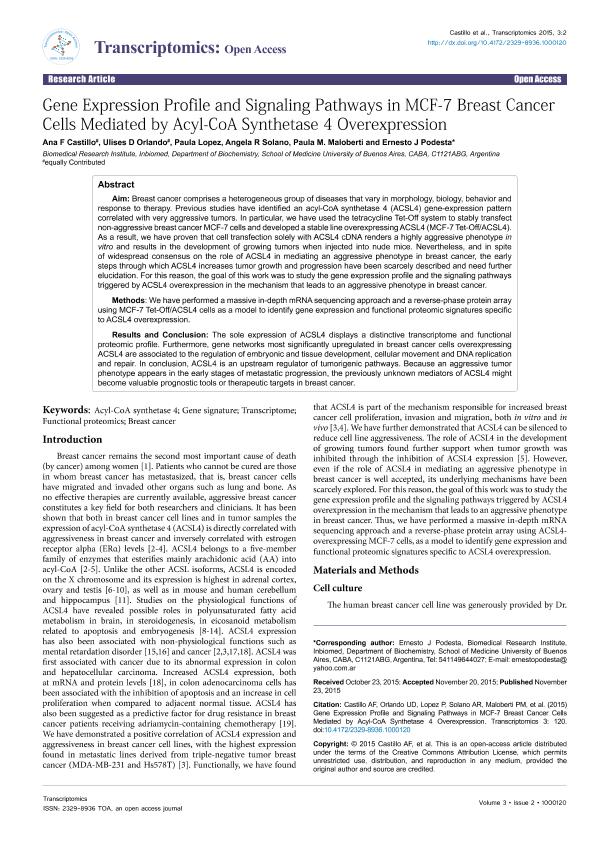Artículo
Gene expression profile and signaling pathways in MCF-7 breast cancer cells mediated by acyl-CoA synthetase 4 overexpression
Castillo, Ana Fernanda ; Orlando, Ulises Daniel
; Orlando, Ulises Daniel ; Lopez, Paula Veronica
; Lopez, Paula Veronica ; Solano, Angela Rosario
; Solano, Angela Rosario ; Maloberti, Paula Mariana
; Maloberti, Paula Mariana ; Podesta, Ernesto Jorge
; Podesta, Ernesto Jorge
 ; Orlando, Ulises Daniel
; Orlando, Ulises Daniel ; Lopez, Paula Veronica
; Lopez, Paula Veronica ; Solano, Angela Rosario
; Solano, Angela Rosario ; Maloberti, Paula Mariana
; Maloberti, Paula Mariana ; Podesta, Ernesto Jorge
; Podesta, Ernesto Jorge
Fecha de publicación:
11/2015
Editorial:
OMICS International
Revista:
Transcriptomics
ISSN:
2329-8936
Idioma:
Inglés
Tipo de recurso:
Artículo publicado
Clasificación temática:
Resumen
Aim: Breast cancer comprises a heterogeneous group of diseases that vary in morphology, biology, behavior and response to therapy. Previous studies have identified an acyl-CoA synthetase 4 (ACSL4) gene-expression pattern correlated with very aggressive tumors. In particular, we have used the tetracycline Tet-Off system to stably transfect non-aggressive breast cancer MCF-7 cells and developed a stable line overexpressing ACSL4 (MCF-7 Tet-Off/ACSL4). As a result, we have proven that cell transfection solely with ACSL4 cDNA renders a highly aggressive phenotype in vitro and results in the development of growing tumors when injected into nude mice. Nevertheless, and in spite of widespread consensus on the role of ACSL4 in mediating an aggressive phenotype in breast cancer, the early steps through which ACSL4 increases tumor growth and progression have been scarcely described and need further elucidation. For this reason, the goal of this work was to study the gene expression profile and the signaling pathways triggered by ACSL4 overexpression in the mechanism that leads to an aggressive phenotype in breast cancer. Methods: We have performed a massive in-depth mRNA sequencing approach and a reverse-phase protein array using MCF-7 Tet-Off/ACSL4 cells as a model to identify gene expression and functional proteomic signatures specific to ACSL4 overexpression. Results and Conclusion: The sole expression of ACSL4 displays a distinctive transcriptome and functional proteomic profile. Furthermore, gene networks most significantly upregulated in breast cancer cells overexpressing ACSL4 are associated to the regulation of embryonic and tissue development, cellular movement and DNA replication and repair. In conclusion, ACSL4 is an upstream regulator of tumorigenic pathways. Because an aggressive tumor phenotype appears in the early stages of metastatic progression, the previously unknown mediators of ACSL4 might.
Archivos asociados
Licencia
Identificadores
Colecciones
Articulos(BIOMED)
Articulos de INSTITUTO DE INVESTIGACIONES BIOMEDICAS
Articulos de INSTITUTO DE INVESTIGACIONES BIOMEDICAS
Articulos(INBIOMED)
Articulos de INSTITUTO DE INVESTIGACIONES BIOMEDICAS
Articulos de INSTITUTO DE INVESTIGACIONES BIOMEDICAS
Citación
Castillo, Ana Fernanda; Orlando, Ulises Daniel; Lopez, Paula Veronica; Solano, Angela Rosario; Maloberti, Paula Mariana; et al.; Gene expression profile and signaling pathways in MCF-7 breast cancer cells mediated by acyl-CoA synthetase 4 overexpression; OMICS International; Transcriptomics; 3; 2; 11-2015; 1-26
Compartir
Altmétricas



